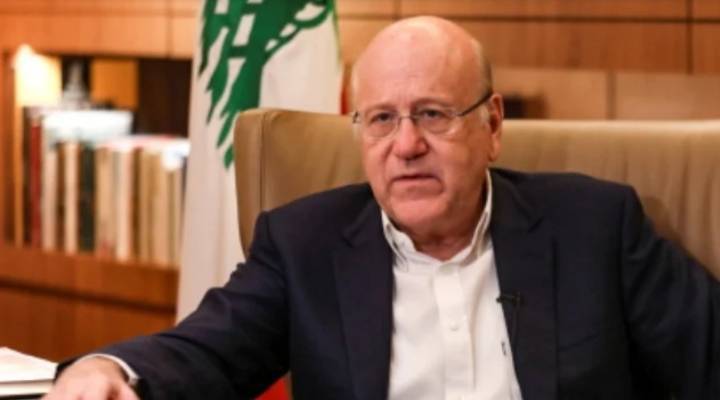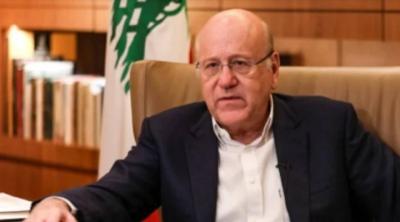Nothing remains in the arena but Najib. The man receives no response. He seems to stand naked in a minefield. Bombs explode around him. He is besieged by crises and is hit by bullets. He is the clearest expression of what remains of the state. He wrestles with raging waves, unable to escape drowning, taking everything down with him. He faces crises in education, health, banking, justice, finance, fuel, and electricity. Political and constitutional crises challenge him, including struggles over powers and encirclement. It remains to be seen whether the man will catch a cold that leads to a high fever, which would trigger an explosion.
### Consequences and Repercussions
In addition to the collapse of Lebanese state institutions, the vacuum is seeping into its core positions. Following the presidential vacancy and the division surrounding the functioning of the Cabinet, the Lebanese government faces the vacancy of the position of the Director-General of General Security, with all the resulting repercussions. A few months remain until the end of the governor of the Central Bank of Lebanon's term. On the military side, the struggle intensifies and expands between the defense minister and the army commander. This has become a hindrance to making administrative decisions. The Free Patriotic Movement disrupts a session for the joint parliamentary committees, in protest against the mechanism for signing decrees. The Public Prosecutor responded to this, as did the Supreme Judicial Council, rejecting interference in the work of the third authority. Thus, crises continue to unfold, while Mikati will not be able to solve or address them, nor even deal with their repercussions.
### The Story of Mikati
Najib Mikati has a long history with the vacuum. He first took office during a moment of political vacuum, serving as a transitional phase to organize parliamentary elections in 2005 after the assassination of President Rafik Hariri. He assumed his second government amidst a coup against President Saad Hariri. This was a transitional phase between a regional-international settlement concerning Lebanon and an entry into a phase of upheaval, the results of which have been reflected in recent years. Currently, the man has reached a state of searching for ways to fill the vacuum. He describes himself as flexible and a corner rounder. However, he cannot convene a government session without the participation of Hezbollah and Amal Movement, amid the boycotting by the Free Patriotic Movement. This need for both parties, juxtaposed with the mutual obstruction among different major forces, has thwarted any attempt to extend the term of General Security Chief Abbas Ibrahim. Notably, when he was asked to extend Ibrahim's term on behalf of Hezbollah Secretary-General Hassan Nasrallah, he replied: "As long as the gentleman requested it from me, I will comply." However, he was unable to do so, and given the extension for Ibrahim and the good relationship with Berri, he would prefer the latter option. Yet, there must be a question about the repercussions of that and what Hezbollah’s reaction will be. Can the party obstruct government sessions later?
### Symptoms of Illness
The ball of extending Ibrahim's term has been thrown into the court of the Prime Minister, just as the efforts to address the crisis between the judiciary and banks, as well as the repercussions of the presidential vacancy. All these crises are bombs exploding in the face of the head of the Al-Azm Bloc. He has reached a stage where his condition resembles that of the country, with all its exploding crises, amid a complete inability to address the repercussions of the illness and its symptoms, not the illness itself or its root causes.
Another struggle pulls the man in different directions between the actions and orientations of the Central Bank governor and the external and internal pressures on Riad Salameh. For instance, on the first day information leaked about the possibility of imposing sanctions on the Central Bank governor, data leaked about the Prime Minister indicating that he no longer relies on the central bank's governor to reduce the dollar's price on the black market, labeling Salameh as incompetent. The following day, following the U.S. embassy’s denial of the sanctions issue and the communication with Salameh, Mikati’s circles denied the leak, and he returned to meet with the central bank governor.
### A Series of Storms
Mikati finds himself caught between the hammer of internal challenges and the anvil of external pressures, especially concerning negotiations with the International Monetary Fund. He knows there is no internal desire for any agreement with the Fund, while the policies of the central bank governor, along with financial, economic sectors, and political powers are based on that. Meanwhile, he is facing enormous external pressures to fulfill the required conditions for signing the agreement. The problem here is that Mikati approaches this file as he did during his periods of presidency, as a form of managing the vacuum or transitional phases.
In practice, the man has no room for solutions or remedies left. Disruption again surrounds his government, to the extent that the few items included in the agenda for sessions are not approved but rather postponed. What has been applied to the non-extension of Ibrahim's term may also apply to many other obligations, while another scene appears regarding the paralysis of the joint parliamentary committees' work in protest against the government's performance and its head. In the face of these storms, Mikati expressed last week his unwillingness to assume the premiership again. However, some accuse him of still seeking it, as one of the elements to satisfy internal and external interests. This drives many to attack him, while some argue that numerous vetoes surround him, making him appear neither with Suleiman nor with Dukan or Bin Salman.




